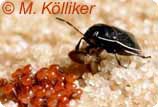séminaire du pôle évolution du vivant – vendredi 8 février 2008
 Parent-offspring conflict and co-adaptation: the behavioural ecology and quantitative genetics side of the same coin
Parent-offspring conflict and co-adaptation: the behavioural ecology and quantitative genetics side of the same coin
Mathias Kölliker, Zoological Institute, Evolutionary Biology, University of Basel, Switzerland
vendredi 8 février 2008, à 11 heures, amphithéâtre Monge, bâtiment Gabriel
The evolution of parental investment induced scope for novel adaptations to the temporary life inside a family group. New selection pressures arising from family life, e.g. through parent-offspring conflict over the optimal allocation of parental resources, triggered the evolution of diverse forms of elaborate communication systems that allow offspring to communicate their resource requirements to their parents. The formation of family groups not only affects the evolution of traits by inducing and altering selective pressures, but also by influencing trait expression and inheritance. Parents and offspring can be considered social environments affecting each other’s behaviors and reproductive decisions. Social environments can be heritable, co-evolve and become coadapted. I will discuss recent theoretical treatments of conflict and coadaptation and present experimental studies testing predictions of these models on patterns of parent-offspring communication in birds (e.g., nestling begging displays) , mammals (e.g., pup suckling) and social insects (e.g., larval solicitation pheromones), highlighting the importance of considering family members as coadapted, heritable social environments in the evolution and maintenance of family interactions and the regulation of parental effort.
- kc_data:
- a:8:{i:0;s:0:"";s:4:"mode";s:0:"";s:3:"css";s:0:"";s:9:"max_width";s:0:"";s:7:"classes";s:0:"";s:9:"thumbnail";s:0:"";s:9:"collapsed";s:0:"";s:9:"optimized";s:0:"";}
- kc_raw_content:
 Parent-offspring conflict and co-adaptation: the behavioural ecology and quantitative genetics side of the same coin
Parent-offspring conflict and co-adaptation: the behavioural ecology and quantitative genetics side of the same coinMathias Kölliker, Zoological Institute, Evolutionary Biology, University of Basel, Switzerland
vendredi 8 février 2008, à 11 heures, amphithéâtre Monge, bâtiment Gabriel
The evolution of parental investment induced scope for novel adaptations to the temporary life inside a family group. New selection pressures arising from family life, e.g. through parent-offspring conflict over the optimal allocation of parental resources, triggered the evolution of diverse forms of elaborate communication systems that allow offspring to communicate their resource requirements to their parents. The formation of family groups not only affects the evolution of traits by inducing and altering selective pressures, but also by influencing trait expression and inheritance. Parents and offspring can be considered social environments affecting each other’s behaviors and reproductive decisions. Social environments can be heritable, co-evolve and become coadapted. I will discuss recent theoretical treatments of conflict and coadaptation and present experimental studies testing predictions of these models on patterns of parent-offspring communication in birds (e.g., nestling begging displays) , mammals (e.g., pup suckling) and social insects (e.g., larval solicitation pheromones), highlighting the importance of considering family members as coadapted, heritable social environments in the evolution and maintenance of family interactions and the regulation of parental effort.
- extrait:
- lien_externe:
- titre:
- Parent-offspring conflict and co-adaptation: the behavioural ecology and quantitative genetics side of the same coin
- intervenant:
- Mathias Kölliker
- date:
- vendredi 8 février 2008
